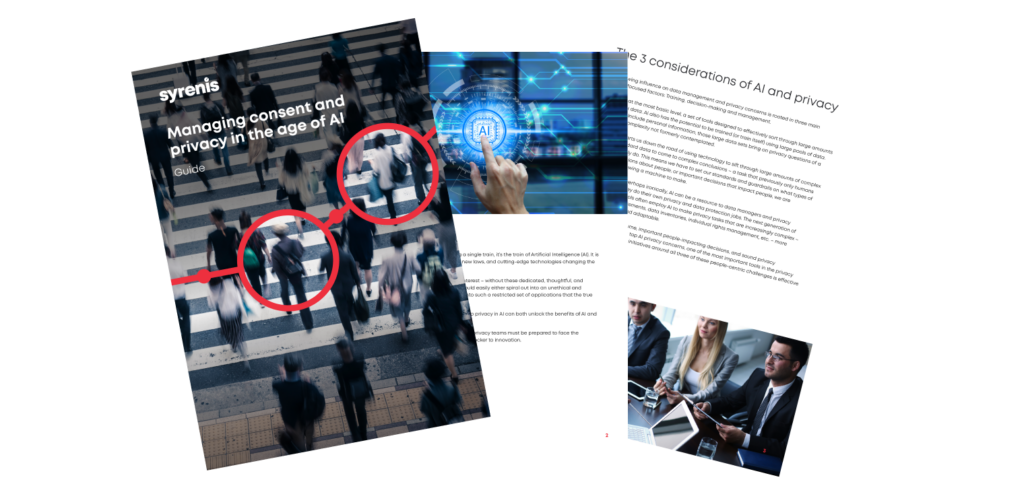As Generative AI (GenAI) continues to reshape industries, from customer service and marketing to healthcare and finance, its rapid adoption is outpacing many organizations’ ability to manage it responsibly. What was once a futuristic concept is now a daily reality, with GenAI tools generating content, making decisions, and interacting directly with customers and employees.
In fact, as of early 2024, 65% of organizations report regular use of GenAI – nearly double the figure from just ten months prior. Overall AI adoption has surged to 72%, up from a plateau of around 50% in previous years.
But with this surge in adoption comes a critical challenge: trust.
People are increasingly aware that GenAI systems rely on vast amounts of personal data to function effectively. Whether it’s tailoring a travel itinerary, generating a personalized product recommendation, or assisting with a medical query, GenAI often operates behind the scenes, using data that users may not even realize they’ve shared, raising important questions about privacy, consent, and control.
Without trust, users may hesitate to engage with GenAI tools or reject companies that use them. With it, organizations can unlock the full potential of GenAI while respecting individual rights and preferences.
This blog explores how companies can build that trust by focusing on three key pillars:
- Reliability and consistency in GenAI behavior and outcomes
- Honesty and transparency in how GenAI is used and how data is handled
- Competence and accountability in managing privacy, consent, and risk
Let’s explore how these principles, borrowed from human relationships, can guide responsible and trustworthy GenAI practices in 2025 and beyond.
As one source states, “Without a purposeful and consistent effort to foster trust and build strong relationships at every step of the way, even the best-designed and thoughtful engagement processes will almost certainly either fail or fall far short of the success you seek to achieve.”
Be reliable and consistent: The foundation of trust in GenAI
Trust begins with predictability. In human relationships, we trust people who behave consistently, who follow through, show up, and act in ways we can anticipate. The same principle applies to GenAI.
If a GenAI tool delivers helpful, accurate responses one day and confusing or incorrect ones the next, users will quickly lose confidence – not just in the tool, but in the company behind it. Inconsistent AI behavior creates friction, frustration, and doubt. And in a competitive market, that doubt can drive customers elsewhere.
Reliability and consistency affects everything from customer satisfaction and brand reputation to regulatory compliance and operational efficiency.
Tips for being reliable and consistent with AI
- Establish a clear AI acceptable use policy to help increase consistency in relevant processes across the organization.
- Train employees on both the acceptable use policy and how to effectively (and consistently) use GenAI tools.
- Set and enforce consistent data quality, privacy, and security standards when selecting or building GenAI tools, and when evaluating outputs.
- Implement regular reviews of GenAI use and outputs according to set standards.
Be honest and transparent: The key to long-term loyalty
Trust thrives on openness, in human relationships, we trust people who are upfront about their intentions, admit their mistakes, and communicate clearly. When someone is secretive or evasive, trust breaks down, and often, so does the relationship.
The same is true for companies using GenAI.
Customers and employees want to know when AI is being used, how it works, and what data it relies on. If they feel misled or kept in the dark, they’re more likely to walk away -possibly for good. But when organizations are transparent about their GenAI practices, they build credibility and foster lasting trust.
Trust is the foundation of customer loyalty, and loyalty drives revenue. In fact, repeat customers spend 67% more than new ones, according to research from BIA/Kelsey and Manta. In this context, transparency isn’t just a regulatory requirement, it’s a strategic differentiator. When passengers understand how their data is collected and used, and see that it’s handled ethically, they’re more likely to engage, return, and advocate. Building that trust through responsible data practices is not just good ethics it’s great for business.
Tips for being honest and transparent with AI
- Provide clear notice to data subjects about GenAI use, training models, available rights (such as the right to object or withdraw consent).
- Design GenAI systems with explainability in mind, so users can understand how outputs are generated.
- Establish clear audit trails and logs, along with regular processes to review and analyze those.
- Updated privacy notices regularly as AI models evolve or data practices change
- Keep accurate and detailed records of notice and consents and how the organization has operationalized the promises they represent. Note that a Consent Management Platform may be necessary to organize, maintain, and report on end-to-end consent management.
Demonstrate competence and accountability: Trust depends on quality
Trust isn’t just about good intentions – it’s about delivering high-quality results, consistently and ethically. In relationships, we trust people who follow through, take responsibility for their actions, and correct their mistakes.
When GenAI tools are used to make decisions, generate content, or process personal data, the stakes are high. A single poor-quality output can damage a customer relationship, trigger regulatory scrutiny, or erode brand credibility. That’s why demonstrating competence and accountability is essential for earning and keeping user trust.
Consumers are far more likely to return to companies that show they can manage GenAI responsibly, deliver accurate results, and uphold ethical standards. In a crowded market, quality is what sets trustworthy companies apart.
Best practices for competence and accountability with AI
- Obtain granular, informed consent from data subjects before using personal data to train GenAI or during its operations.
- Align with global privacy and security laws by implementing a strong consent management framework, such as a Consent and Preference Management Platform (CPM).
- Establish protocols for reviewing GenAI outputs for quality and adjust as needed.
- Acknowledge and address errors transparently and make corrections.
- Minimize risk. For example, use anonymized data or avoid sensitive personal data
- Obtain dynamic consent, allowing individuals to update their preferences as GenAI models evolve and data use changes.
The full value of GenAI
As GenAI becomes more deeply embedded in business operations, trust is emerging as the single most important factor in its success. Customers and employees alike want to know that the AI systems they interact with are being used ethically, transparently, and responsibly.
Without trust, GenAI adoption stalls, reputational risks rise, and customer loyalty erodes. But when companies demonstrate that they are using GenAI in a consistent, honest, and accountable way, they build confidence – and that confidence drives engagement, retention, and long-term value.
To earn that trust, organizations must:
- Deliver reliable and consistent GenAI experiences
- Be honest and transparent about how AI is used and how data is handled
- Show competence and accountability in managing privacy, consent, and risk
Trust is a compliance goal AND a competitive advantage. Companies that prioritize it will not only meet regulatory expectations but also strengthen their brand, deepen customer relationships, and maximize their return on GenAI investment.
And with global GenAI spending projected to reach $14.2 billion in 2025, more than doubling from $5.7 billion in 2024, the commercial stakes have never been higher.


